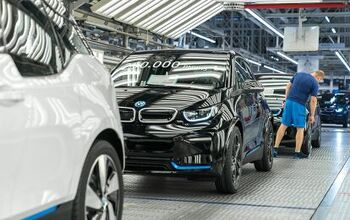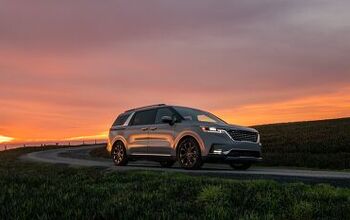Bark's Bites: Some Internet Truths Aren't So True

One of the best worst things about the Internet is how many “experts” there are on every single subject under the sun. Among the easiest subjects for anybody to obtain indisputable guru-like status on, based on what I see around the web, is finance.
And, boy, do they love to share their expertise, solicited or not.
- Buying used is always better than buying new
- Buying is better than leasing
- Financing cars is a terrible idea
Now, let me tell you what I believe:
- I almost exclusively buy new
- I’ve now leased four cars
- I would never, ever, ever pay cash for a car
I’ve already written one post debunking the used > new myth that upset some commonly held precepts. But there’s more to be said on this subject—so let’s say it.
- Yes, there is no doubt that new cars depreciate at a more rapid pace than used cars do. But if that’s all you’re taking into account when making the decision to go new or used, then you’re missing huge pieces of the pie. First of all, if you plan to finance a car, understand that finance rates are always much better on a new car than on a used one—sometimes as little as zero percent. Used car finance rates are tough to get under four percent, even with excellent credit. With the average new car in this country costing right around $30k, that is a difference of $3300 or so over sixty months, or just about eleven percent of that car’s overall value. If your credit is only so-so, don’t worry on a new car—the financial arms of Ford, Ally, BMW, Honda, Hyundai, and others are happy to give great finance rates to 650 and above. Not so on used—you’re now looking at 6 or 7 percent, which equals almost six grand, or twenty percent! And you were worried about depreciation that whole time, stepping over dollars to pick up pennies. Silly Internet guy. Turns out that you are going to pay just as much for a used car as a new one.
- Leasing makes PERFECT sense if you don’t plan to keep a car for very long. If the market value of the car is, at any time, greater than the residual amount owed on the car, you can sell it and profit. If it’s less, you simply walk away from the car at the end of your term. Too many people seem to take everything Dave Ramsey says as financial gospel, but in this case, at least, he’s dead wrong. Like, super dead wrong. In his example that everybody likes to quote, Ramsey uses outlandish numbers. Nobody leases a car for sixty months. Finance companies aren’t charging any more interest on leases than they are on purchases. My Fiesta lease had a money factor of zero, for example. And yes, car dealers make more money from leases than they do from cash purchases. SHOCKER. If you aren’t smart enough to negotiate a lease, then you aren’t smart enough to negotiate a purchase, either. I know, I know, Mr. Internet Guy, you buy all of your cars with the intention of keeping them for fifteen years. Good for you. That’s not what anybody in the real world does. I keep cars for three years or less. So does everybody else I know who actually likes cars and doesn’t view them simply as an appliance.
- Virtually every investment you can make on the market is going to pay you a better return than the zero or 1.9% percent promotional financing being offered by every single lender right now. Why on Earth would I pay thirty thousand dollars in 2015 dollars for a car when I could pay that money over time at no penalty? Every single day, my money can be earning interest and/or gaining returns. Plus, every dollar I pay in 2020 is worth approximately ten percent less than a dollar I spend in 2015. I will never understand why people act like debt is this horrible thing. Debt is only a horrible thing if you A) can’t afford to pay it or B) you negotiated hideous terms for yourself. Corporations take on debt. Billionaires take on debt. It allows them to leverage the cash they have to make other investments. It allows them, as noted TTAC contributor Domestic Hearse says, to bet on themselves, to do things they couldn’t otherwise. My 401(k), for example, has been yielding an average return of nearly eleven percent. Which would be smarter—to take my 17K a year to continue to max that out? Or to take my cash and buy a depreciating asset? If you chose Option B, I advise enrolling in a finance class—and not one taught by Dave Ramsey.
Here’s a little financial tip from your Uncle Bark: your money is getting worth less and less Every. Single. Day. It’s called inflation. Every day that you aren’t enjoying your money is a day that you’re wasting it. Every single day, I have a Boss 302 and a Fiesta ST in my garage. They make me happy every day. Do you know why? Because I love cars.
I’m guessing that if you’re here, you obviously love cars, maybe even more than I do. Do yourself a favor—don’t keep yourself from buying a car that will make you happy because you’re worried about following some financial advice that’s being distributed by people who don’t know anything about finance. It’s easy to say that debt is bad, because debt might scare some simple-minded people. Debt has never scared me for one second. I bet on myself every day, and every day, I win. So should you.
I’m going to die someday. We all are. Do you want to spend another day driving something that you don’t love? If you love cars, do yourself a favor. Go get a car that you love. Screw the “experts.” Don’t listen to them. Their advice is based on fear. Mine is based on love. Love of life. Love of cars. I bet you share that love with me. Don’t box your love up in an ’06 Corolla. Let it shine. If you want to buy new, buy new. If you want to lease it, then lease it.
Who cares what the prevailing wisdom is? I’m more interested in prevailing.

More by Mark "Bark M." Baruth
Latest Car Reviews
Read moreLatest Product Reviews
Read moreRecent Comments
- Jeff Self driving cars are not ready for prime time.
- Lichtronamo Watch as the non-us based automakers shift more production to Mexico in the future.
- 28-Cars-Later " Electrek recently dug around in Tesla’s online parts catalog and found that the windshield costs a whopping $1,900 to replace.To be fair, that’s around what a Mercedes S-Class or Rivian windshield costs, but the Tesla’s glass is unique because of its shape. It’s also worth noting that most insurance plans have glass replacement options that can make the repair a low- or zero-cost issue. "Now I understand why my insurance is so high despite no claims for years and about 7,500 annual miles between three cars.
- AMcA My theory is that that when the Big 3 gave away the store to the UAW in the last contract, there was a side deal in which the UAW promised to go after the non-organized transplant plants. Even the UAW understands that if the wage differential gets too high it's gonna kill the golden goose.
- MKizzy Why else does range matter? Because in the EV advocate's dream scenario of a post-ICE future, the average multi-car household will find itself with more EVs in their garages and driveways than places to plug them in or the capacity to charge then all at once without significant electrical upgrades. Unless each vehicle has enough range to allow for multiple days without plugging in, fighting over charging access in multi-EV households will be right up there with finances for causes of domestic strife.


































Comments
Join the conversation
328 comments but I still want to chime in with my "expert" idea. When I paid off my house several folks said it was a mistake, no more tax deduction, using other peoples money and more. What they don't understand is the financial freedom you have when you have no obligations and that includes paying cash for my cars and keeping them for as long as I can stand. I like to think I'm the poor man's version of being "financially independent."
After foolishly spending the time to read these comments I think I'm now ready to put this whole topic in the bucket of things nobody on the Internet will ever change their mind about, no matter how well presented the opposing view. It's the car-forum equivalent of abortion or Israel/Palestine. We're in a remarkable period right now, where car loans are free or nearly so, and the value of virtually every investment asset class you can buy with your liquid capital has been going up in value sharply for five straight years. If you don't *have* liquid capital, then you probably need to make whatever car decision lets you save some and get to a job regularly so that you can earn more. If you do, then congratulations, you've got options; maybe one of those is to forego expected absolute financial returns in order to buy peace of mind. Peace of mind might look like 5 years worth of expenses sitting in an FDIC-insured savings account, or peace of mind might look like two high-performance Fords in the driveway. That's a very personal thing - economics 101 says that people will "rationally" pursue whatever they perceive to be utility, not that they will choose what they perceive to be utility in a perfectly emotionally detached way. I'll just add this story: A very free-spirited friend of mine called the other day to tell me her 100k-mile 2008 Subaru needed a new engine because she'd run it out of oil. The mechanic wanted $5k to replace it with a used 60k-mile motor. She's got a high-paying technical job, Tier 1 credit, but only enough total savings for the next adventure vacation (YOLO!). Obviously the TTAC thing to do is to run down to the pick-n-pull and get a $250 motor, swap it in the driveway, and continue running the Shroomaru into the ground until the suspension pickups rust to infirmity and the mouse-fur headliner falls down around your head like a Japanese sombrero. Just as obviously, my friend was in no way qualified to do that, and I'm not a good enough friend to spend the weekend doing an engine swap on a clapped-out appliance car just as a favor. In a world where a Tier 1 credit score gets you a $0 down lease with a 2% interest rate, but a mechanic's labor is $165/hour, that lease is a pretty damn rational choice. In other worlds, it's really not. All depends on your situation.